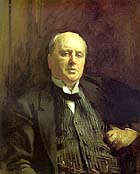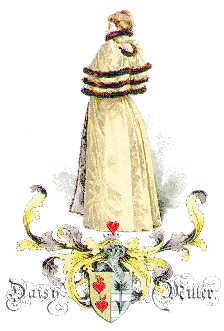 |
Henry James' Daisy Miller: The Tragedy of the Autonomous Self |
| I would like us to consider how many of the
problems of the modern self, a self without God (either explicitly or functionally), are
enacted in the behavior of Daisy, Winterbourne, and the American ex-patriate community in
Rome. While James' Daisy Miller is written in the middle of the realist period in literature, it is also part of the larger sweep
of Modernism that can said to have begun even as early as the Enlightenment, but certainly
by the influx of nineteenth-century changes in science, psychology, economics, and
politics. We can contextualize the issue of the modern self in three ways--by looking at
'the world' as a denial of the supernatural or God-given; by examining the resulting
dilemma of the modern self; and by recognizing the assumptions that exist behind western
individuality. 1) The "World" as Sinful Construction Craig M. Gay writes:
According to Gay, the world (or cosmos to invoke the New Testament term) is the way in which human beings seek to understand the world without God as its source and lord. In modern times, we live our daily lives, make our economic, political, and many times even ethical decisions, and create and experience culture without considering God. At best, we have privatized our spiritual lives in such a way that spirituality is reduced to something personal and domestic. 2) Conditions of the Modern Self:
Adapted from Gay, Craig M. The Way of the (Modern) World:
Or, Why It's Tempting to Live As If God Doesn't Exist. Grand Rapids: Eerdmans, 1998. |
|
| 3) Peter Berger's Six Propositions on The
Nature of Western Individuality Thus, with the above in mind, this is how most of Western society understands human identity:
Berger, Peter L. "Western Individuality: Liberation and Loneliness," Partisan Review 52 (1985). |
 |
| The image above is of Torsten
Renqvist's 1971 Ordet. It is an image of Christ. I have chosen to
include it here because it represents a very Romantic notion of Christ, one who is a
self-actualized hero. Christ projects himself by force of will outside of his
circumstances. By the power of his imagination he overcomes the wounding he receives
in his hands. Renqvist's vision of Christ is essentially a modernist one, in which
creed and religion have been reduced to a therapeutic desire for internal
expression. In this sense, Ordet is emblematic of the false solutions that
the modern self is left with. |
|
| James' Daisy Miller is concerned with a number of issues revolving around the expectations of societies (European and American), the mores of family, social set, and romance, as well as the search for acceptability within these spheres of influence. James in his essay "The Art of Fiction" argues that "a novel is a personal and direct impression of life," but it is one that seeks to produce what the author regards as a realistic portrait of life, both good and evil. The novel is particularly powerful for its ability to dramatize consciousness. Likewise, incidents follow from character; the plot results from the inclination of characters. In James' mind, it is a mistake to separate one from the other. Consider, as you work through the questions below, how James conceives of his characters' dilemmas. What is he saying about the nature of the world and individuals? Is he correct? | |
Questions
|
|
| Another way to frame the issue at stake in questions 7-9 is to consider where the final source for right and wrong is located. Christians believe that this is God. Yet even if you believe in absolutes, you still have to consider the question of how absolutes work themselves out in different cultures. Daisy's behavior is understood one way in America and another in Europe. At home, she would not be judged a loose girl, but in Rome she is. Even if you believe that her intentions are good (i.e., she is essentially innocent throughout the story), the question still remains whether the individual's right to be "true" to herself should take precedent over the judgments and mores of another culture. How should one adjudicate between the individual's search for freedom and self-identity and the claims of the community or culture to judge what behavior is loose? | |
